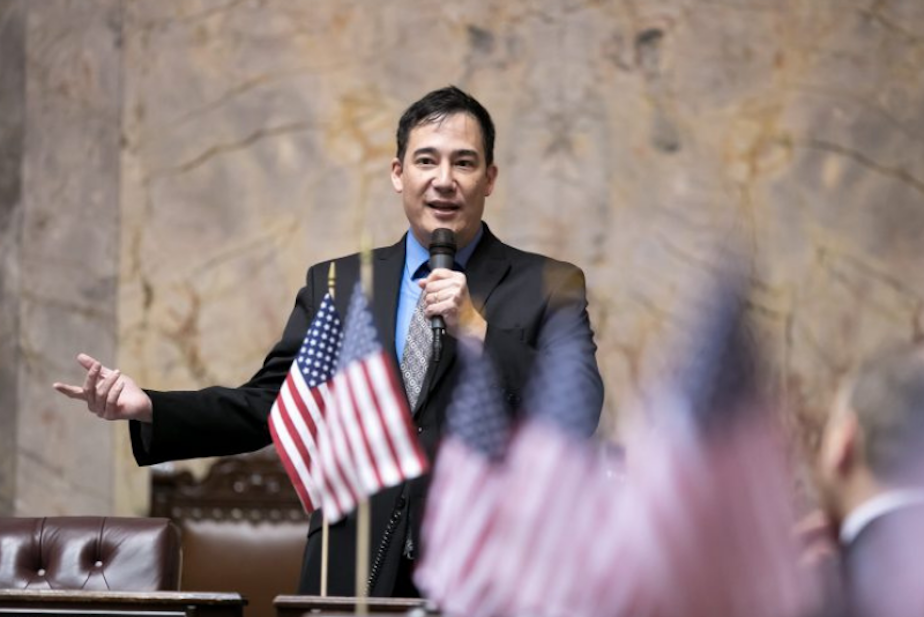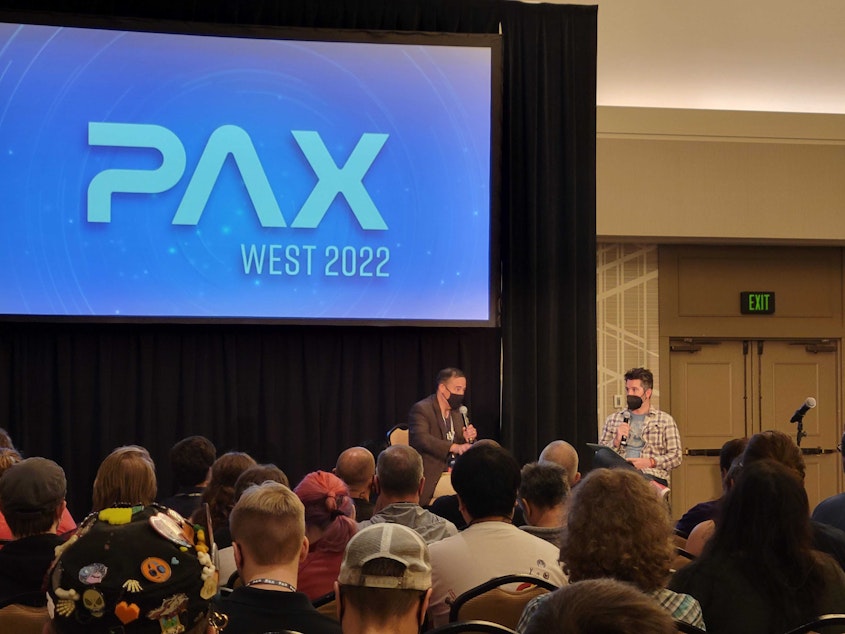Should Sec. of State, the 'junk drawer' of state government, be nonpartisan?

Washington's secretary of state is an interesting job.
In a lot of ways, it’s pretty administrative. They supervise the state archives. They coordinate implementation of the state's records management laws.
But what they've become most well known for is supervising and certifying state and local elections.
Some say, to do that job properly, the position should be nonpartisan.
Last Friday, around 200 people crowded into a conference room at PAX West, the massive gaming conference in downtown Seattle.
They weren’t there to see their favorite streamer, or get the scoop on a new game.
They were there to listen to a candidate for political office — Washington Secretary of State Steve Hobbs, who is running to retain his position this fall after he was appointed by Gov. Jay Inslee to replace Kim Wyman, who took a cybersecurity post in the Biden administration.

"I am the custodian of the great seals right out of a Tolkien novel," Hobbs told the crowd. "But over the years, they've added more things to the secretary of state. They've added elections. I've got libraries and state hospitals. We've got corporations, charities, nonprofits, and we also have what we call state legacy, which is the history of Washington state. We are the junk drawer of state government. Shove it in there. Whenever the Legislature comes up with something new, just like give it to the secretary of state's office."
Sponsored
Hobbs describes himself as a major nerd, hence his PAX West appearance.
This is Hobbs' first time running for the office. And he’s running as a Democrat, facing Pierce County Auditor Julie Anderson, an independent.
None of the Republican candidates made it through the top-two primary in August.
That's unusual. The former secretary of state, Kim Wyman, was a Republican. In fact, Washington voters returned Republicans to the job for 60 years.
Rob McKenna says that's because the job is about experience, not party affiliation.
Sponsored
"I think the secretary of state's office should be directed by someone with the right experience and that means election supervision experience," McKenna said.
McKenna is a Republican and served as Washington’s attorney general from 2005 to 2013.
He also endorsed Anderson in the primary.
McKenna says Anderson is the only candidate with election supervision experience. The importance of that experience is one of the reasons McKenna thinks the secretary of state post should be nonpartisan.
"The only reason it's not already is that as a state, we've chosen to make it a partisan office," McKenna said. "So if you'll think about different elected offices in our state, many of them are nonpartisan. For example, our judges are elected on a nonpartisan basis."
Sponsored
Cornell Clayton is the director of the Thomas S. Foley Institute for Public Policy and Public Service at Washington State University, where he also serves as the C.O. Johnson Distinguished Professor of Political Science. He says there's a history to the position's partisan nature.
"It is a result of the fact that our constitution was created during the progressive era and the populist era — in the 1880s, 1890s," Clayton said. "And many of the states that created their constitutions at that time were impacted by the desire to have more direct democracy. And so almost all of their executive branch officials, and many of their judicial branch officials are directly elected, and that includes the secretary of state in Washington."
In fact, the secretary of state's office pointed out that it was not the state constitution, but state law that made the office partisan. Government officials wanted to weed out corruption in the system. Creating positions that were accountable to voters seemed like the way to do that.
During less tumultuous times, Clayton says the system works. Normally, a partisan affiliation motivates voters. It gives them cues they might not otherwise have on positions they might not normally pay attention to.
"When our party system has become so polarized, and one of the main issues driving that polarization in the last couple of election cycles has been the administration of our elections, then the system is much more problematic," he explained.
Sponsored
Making the position nonpartisan would involve changing state law. But, Clayton says, it would be much easier to make county and local level offices nonpartisan. Some places already have.
More than choosing to be partisan or not, Clayton says he hopes the next secretary of state will work to reassure the public of the safety of the voting system.
"Washington runs a very good electoral system by almost all measures," he said. "It's one of the most fair and cleanest and secure election systems in the country. And it's important that party leaders in the Legislature and elsewhere communicate to voters that they can trust our elections."
Correction: a prior version of this story asserted that the Secretary of State position is partisan due to Washington's Constitution. The office is actually partisan due to state law RCW 29A.04.110, not the state's Constitution.





